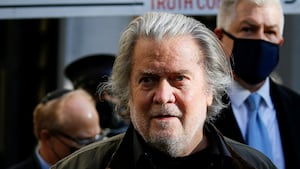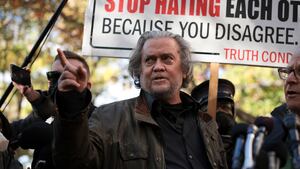Federal prosecutors going after Steve Bannon for contempt of Congress revealed on Wednesday that they sought no approval from higher-ranking Justice Department officials before they took the unusual move to spy on his lawyer—in addition to erroneously targeting a number of other Americans with similar names.
That action seemed to disturb U.S. District Judge Carl Nichols, who repeatedly asked prosecutors why they thought it proper—or even relevant—to secretly gather a log of defense attorney Robert Costello’s private phone calls, text messages, and emails.
“What’s unique here is that the government didn’t just go get regular records,” Nichols said. “Why is that an appropriate first move?”
The judge ruled Wednesday that the government must turn over the phone records requests and the phone records themselves for his private review. That includes information the Justice Department received from Comcast, Google, and Yahoo.
“The behavior of the FBI and, quite frankly, DOJ has been outrageous to my attorney and the attorney-client privilege,” Bannon said outside the courtroom Wednesday afternoon.
“Everything that was in the background of this, everything that went to the grand jury. Everything ought to come out,” Bannon said. "The media ought to have—the American people ought to have—access to all the information about this. It’s in your interest, and it’s worth fighting for.”
Amanda Vaughn, the lead prosecutor on the case speaking in court, stressed that “we never sought content of any communications.” Instead, the DOJ said it sought “toll records,” indicating who Costello was calling or writing to and when he did so.
Although it remained unclear why the Justice Department would make this move—potentially violating established protections for communications between attorneys and their clients—Vaughn hinted that law enforcement was verifying whether Bannon was truly relying on his attorney’s advice when he refused to testify before the Jan. 6 Committee in October.
“Costello is the intermediary here. It’s possible Costello never fully communicated what was…here,” she told the judge, conceding that “it may not be the most direct evidence.”
“We’re not just hoovering up privileged materials,” she said. “It doesn’t tell us anything about confidential communications.”
Toward the end of the hearing, Costello aggressively criticized the DOJ.
“I’m the actual Robert Costello they were looking for,” he began. “It, quite frankly, shows a terrible abuse of the grand jury process.”
The defense lawyer, who years ago worked as a federal prosecutor in Manhattan alongside Rudy Giuliani, said he would have never approved crossing this red line during his time at the Justice Department. Costello also told the judge how he twice met with prosecutors virtually in early November in an attempt to dissuade them from filing criminal charges against Bannon.
He said the FBI quietly sat in on one of those meetings and repurposed the informal attorney-to-attorney proffer as a formal FBI interview—something he described as a foul attempt to drive a “wedge” between him and his client.
“They viewed this as an opportunity to turn me into a witness. I was making a legal presentation on a declination,” he said. “I certainly was not advised this was an FBI interview.”
Costello said the government’s secret acquisition of his personal cell, work landline, and home phone records were a violation of his rights—and potentially that of his other client in an unrelated case: Giuliani.
In court, prosecutors made the startling assertion that this kind of surveillance would require more department scrutiny if they wanted to get a defense lawyer’s records directly from them. But, they explained, additional authorizations could be avoided because the feds went to telecom and tech companies instead.
Bannon’s other lawyers, Evan Corcoran and David Schoen, seized on that.
“That… is absurd on its face. There is a special relationship between an attorney and their client,” Schoen told the judge. “Hopefully the inspector general sees things differently.”
“What on Earth were they going to tell from the records? They knew he was communicating [with Bannon,]” Schoen added. “I think what happened is outrageous.”
The judge said he understood that Bannon’s team might seek some kind of reprimand against investigators or a referral to a watchdog agency, but he held back from taking any action for now.
It’s been clear from the start that this seemingly simple case was going to become a protracted, nasty legal fight. The day he pleaded “not guilty” on Nov. 17, Bannon told reporters outside the federal courthouse that he would turn this into the “misdemeanor from hell for Merrick Garland, Nancy Pelosi, and Joe Biden.” And Bannon’s legal team appears to see this case as an opportunity to blow up the legal system. Indeed, his initial legal strategy has been to attempt rummaging through White House and congressional documents, potentially harming the Jan. 6 Committee’s investigation.
But the case took a surprising turn in early February, when Bannon’s attorneys revealed in court documents that the FBI had secretly spied on Costello. Last week, The Daily Beast detailed how the FBI targeted the private communications of several obviously wrong Costellos, including a much younger one in a different New York city and a FEMA employee in a different state.
On Monday, the DOJ in court filings asked the judge to inquire how The Daily Beast broke that news and whether this reporter had received restricted documents.
Some legal scholars think this FBI dragnet could affect the Justice Department’s ability to go after Bannon himself. When The Daily Beast brought up these issues last week to South Carolina law professor Wadie Said, he explained that investigators did more than "create a lot of work for themselves and irrelevant information." They potentially damaged their own case.
"That looks incredibly weird and overreaching," he said. "When you operate in such a broad fashion, you open yourself up to a skilled attorney picking apart your techniques."
At issue here is the Justice Department’s use of U.S. Code 2703, which allows the government to quietly force a company to turn over “the contents of a wire or electronic communication” from the past 180 days. It allows law enforcement to require traditional telecoms, like Verizon or AT&T, or even tech companies, like Apple and Google, to turn over customer data.
It wasn’t all bad for the feds, though. On Wednesday, the judge declined to give Bannon’s team copies of secret materials from the grand jury that indicted him, such as instructions jurors received from prosecutors or subpoenas they sent out in pursuit of Costello’s records. He also seemed unconvinced by arguments that Bannon’s refusal to testify didn’t meet the legal definition of “willful” just because he was relying on his lawyer’s advice.
As an ex-Trump White House official, Bannon has publicly claimed that he couldn’t be forced to testify about communications with former President Donald Trump concerning the violent insurrection on Jan. 6, 2021, because of residual executive privilege—a bogus theory that was struck down by a federal district court and an appellate panel, and ultimately didn’t pass the Supreme Court.
But Nichols did hand Bannon’s team a potential first dip into never-before-seen Justice Department records, ruling that the DOJ must now turn over internal memos—"public or not”—that would indicate any policy discussions about prosecuting current and former White House officials.








